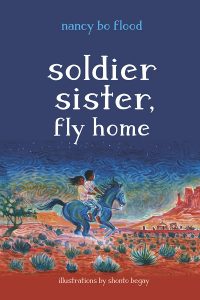 Soldier Sister, Fly Home
Soldier Sister, Fly Home
Written by Nancy Bo Flood
Illustrated by Shonto Begay
Charlesbridge, 2016, 160 pp.
ISBN-13: 978-1-58089-702-0
The struggles of a thirteen-year-old girl searching for her own identity that is shared between her Navajo and white heritage is a universal story of individual conflict. This powerful novel for readers of all ages is set within the larger context of the conflict in Iraq, where, in 2003, Lori Piestewa was the first female Native American to die in combat in a foreign territory. This true event is the starting point for a story narrated by a young girl named Tess, whose sister was a fictional friend of Lori’s and is also serving in Iraq.
From the start of this novel, when Tess and her family take part in a ceremony honoring Lori, and throughout the entirety of this powerfully emotional story, readers can learn about Navajo ways of life, as well as the cultural dissonance that challenges members of the tribe at all ages. Tess continually questions her role at home on the Rez and at school in Flagstaff. She, along with the reader, comes to realize that her life is truly a blend of contemporary and traditional: she lives in two different social worlds. She is also faced with coming to terms with her sister’s decision to enlist in the army and the fear of losing her in the same way that they have lost Lori. As Tess deals with her personal challenges, her Navajo grandparents help her realize that the two worlds of her life do not have to “fight” inside her. She is also challenged by her sister’s request to take care of her stallion, Blue. Blue’s personality is often wild, and is challenging but endearing as tragedy creates yet another conflicting element of the story.
A significant aspect of this book is the information about Navajo life presented in a highly engaging story–a feature that is realistic and seldom seen for young readers. The traditional Navajo practices and respect for nature are revealed in the daily lives of the characters. The pride and respect of the Navajo regarding those who have served in the military is evident through the ceremonies they give to honor those who passed, to grant protection for those leaving for conflict, and to revere all veterans, such as in the Veterans Day Parade. Tess’s Grandfather was a code talker and the respect for this role is widely acknowledged in the novel. Nancy Bo Flood also provides rich descriptions of the natural world and the daily lives of the family through Tess’s perspective. Family relationships and respect are authentically reflected as a blend of both traditional and contemporary life. The relationship between the sisters is portrayed both personally as they struggle to negotiate between cultures and universally as they reveal emotions that are experienced by others. One commentary included on the back cover by Linda Ross, a Navajo traditional healer and counselor, states, “Nancy has captured the Navajo way of life today and brought my childhood memories of long ago to life.”
Nancy Bo Flood spent fifteen years on the Navajo reservation teaching and living among its people. Her keen sense of Navajo lifestyle and how the Navajo people attend to the challenges of integrating into contemporary society is evident in Soldier Sister, Fly Home as well as in the other books about the Navajo nation she has written. More information on her work can be found at nancyboflood.com.
Flood has provided a brief ending commentary about the Navajo language and glossary of words used in the book, as well as questions to guide discussions around the novel. In an author’s note, Flood reveals that this powerful, moving story is a tribute to Lori Piestewa. Highly honored for her bravery in service, Lori was a member of the Hopi tribe.
Shonto Begay is well known for his art and poetry that reveal the natural beauty of life on and around the reservation. He has created the cover art for the story and the drawings introducing the chapters. More information can be found at: https://www.facebook.com/Shonto-Begay-6074182987/
This book can be paired with other books that consider Native Americans and US conflicts, such as The Unbreakable Code (Sarah Hoagland Hunter, 1996), Code Talker (Chester Nez, 2012), and Weedflower (Cynthia Kadahota, 2006). The theme of identity for bicultural teens is present in other novels that would be perfect for paired discussions, such as Orchards (Holly Thompson, 2012); Voices in First Person (Lori Marie Carlson, 2008); Inside Out and Back Again (Thanhha Lai, 2012).
Janelle Mathis, University of North Texas, Denton, TX
WOW Review, Volume IX, Issue 2 by Worlds of Words is licensed under a Creative Commons Attribution-NonCommercial-ShareAlike 4.0 International License. Based on work at https://wowlit.org/on-line-publications/review/ix-2/
